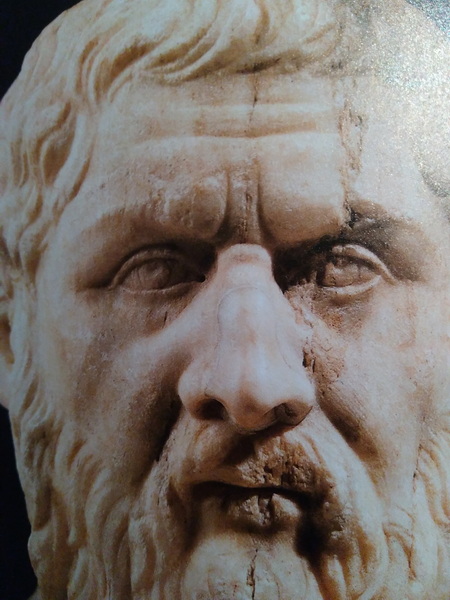
Franz Lindenmayr / Mensch und Höhle
Der Tod des Empedokles von Friedrich Hölderlin

Empedokles - der erste "Vulkanspeläologe"?
"Nichts, das, wie ein Abgrund, um uns her uns angähnt." Hölderlin, in einem Brief vom 2.11.1797 an seinen Bruder
Ein Mensch stürzt sich in den Krater eines glühenden Vulkans. Warum?
Ist das nicht sofort die Frage, die "vernünftige" Menschen stellen werden?
...
...in Vorbereitung
"In the beginning ….
Empedokles (494-443 BC), a Greek pre-Socratic philosopher
from Agrigent in Sicily, died, according to one
version, through a leap into the crater of Etna around 443
BC. Others claim that he left secretly for the
Peloponnese and lived there happily until he died of old
age, and others say he died in a carriage race. As a
sign of his suicide, he left a sandal which was later found
by his adherents. You can see in him as the first
dedicated vulcanospeleologist who wanted a break-through
experience. He claimed to be a god and believed
in reincarnation, so his disappearance was not for ever.
Many writers and artists used this story and retold it
again and again. Just to name a few: Friedrich Hölderlin
in Der Tod des Empedokles, Berthold Brecht with Die
Sandalen des Empedokles and Jean-Marie Straub/Danielle
Huillet Schwarze Sünde.
Empedokles (494-443 BC), a Greek pre-Socratic philosopher
from Agrigent in Sicily, died, according to one
version, through a leap into the crater of Etna around 443
BC. Others claim that he left secretly for the
Peloponnese and lived there happily until he died of old
age, and others say he died in a carriage race. As a
sign of his suicide, he left a sandal which was later found
by his adherents. You can see in him as the first
dedicated vulcanospeleologist who wanted a break-through
experience. He claimed to be a god and believed
in reincarnation, so his disappearance was not for ever.
Many writers and artists used this story and retold it
again and again. Just to name a few: Friedrich Hölderlin
in Der Tod des Empedokles, Berthold Brecht with Die
Sandalen des Empedokles and Jean-Marie Straub/Danielle Huillet Schwarze Sünde.
Aus: Lindenmayr, Franz (2022) Down the crater
....
Aus dem Internet:
"Eine filmische Adaption von Hölderlins unvollendet gebliebenem
Trauerspiel: Das Stück handelt von dem vorsokratischen griechischen Philosophen
Empedokles, der vergeblich versucht, seine Mitmenschen von einem Leben im
Einklang mit der Natur zu überzeugen. Stattdessen wird er ins Exil verbannt.
Als Konsequenz stürzt er sich in den Krater des Ätna. Hölderlin schrieb das
Stück 1799, „unter dem Eindruck der französischen Revolution. Die Botschaft
ist eine kommunistische und sie lautet: Es gibt nur eine Rettung für die Erde
und die Erdenkinder – den Kommunismus“, kommentierte Jean-Marie
Straub."
Eine originelle Bearbeitung des Empedoklesthemas ist in GARCIN zu finden.
Die Sandalen des Empedokles am Kraterrand....
Literatur:
Garcin, Etienne & A. Dan (2022): Philosophix, Knesebeck, München, 3. Auflage
Lindenmayr, Franz (2022): Down the crater, in: Proceedings of the 20th International Symposium on Vulcanospeleology, Catania, 2022, p 208f.
Prignitz, Christoph (1985): Hölderlins „Empedokles“, Helmut Buske
Verlag, Hamburg
Links:
Im Garten am Rande des Abgrunds https://taz.de/!1757111/
Schriftsteller und ihre Werke mit Höhlenbezug
| [ Index ] | [ Englisch version ] | [ Höhlen und Höhlengebiete ] | [ Kunst ] |
| [ HöRePsy ] | [ Höhlenschutz ] | [ VHM ] | [ Veranstaltungen ] | [ Links ] |